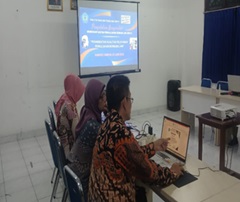Pelatihan Penggunaan LMS untuk Peningkatan Kualitas Layanan Perkuliahan di Fakultas Sains dan Teknologi, Universitas Respati Yogyakarta
Training on Using LMS to Improve the Quality of Lecture Services at the Faculty of Science and Technology, Universitas Respati Yogyakarta
DOI:
https://doi.org/10.33084/pengabdianmu.v10i2.8500Keywords:
Improved Learning Services, LMS Content Filling, Learning Management SystemAbstract
Training on the Use of Learning Management Systems (LMS) is essential for enhancing the quality of academic services in an era of increasingly adopting technology. The integration of LMS with conventional methods, known as blended learning, which combines distance learning, regular classes, and LMS, results in a more effective and efficient learning process. With the shift towards digital learning, LMS use becomes crucial for improving the efficiency, accessibility, and quality of academic services. Through e-learning, students not only listen to lectures but also actively observe, perform, demonstrate, and more. Teaching materials can be virtualized in various formats to create more engaging and dynamic content, motivating students to delve deeper into the learning process. This training aims to equip educators and administrative staff with knowledge of LMS features and potential, enabling them to maximize its use for content delivery, facilitating teacher-student interaction, and enhancing course management and evaluation. The training methods include presentations on basic LMS concepts, demonstrations of key features, and hands-on practice sessions that allow participants to actively engage in the learning process. Additionally, interaction between participants and facilitators is enhanced through discussions and Q&A sessions, ensuring deep understanding and practical skills in LMS usage to improve academic service quality. Consequently, this training is expected to provide a solid foundation for educational institutions to meet challenges and leverage the opportunities offered by the digital era in providing quality academic services.
Downloads
References
Bradley, V. M. (2021). Learning Management System (LMS) Use with Online Instruction. International Journal of Technology in Education, 68-92. https://files.eric.ed.gov/fulltext/EJ1286531.pdf
Hilna Putria, L. H. (2020). Analisis Proses Pembelajaran Dalam Jaringan (DARING) Masa Pandemi COVID-19 pada Guru Sekolah Dasar. Jurnal Basicedu , 861-872. https://doi.org/10.31004/basicedu.v4i4.460
Kaseem, M. (2018). Balancing Technology With Pedagogy in English Language Classroom. Teachers Perspective , 1-19. https://www.researchgate.net/publication/329248065_BALANCING_TECHNOLOGY_WITH_PEDAGOGY_IN_ENGLISH_LANGUAGE_CLASSROOM_TEACHERS'_PERSPECTIVE
Niken Probondani Astuti, R. B. (2022). PelatihanLearning Management System(LMS) UntukPeningkatan Kualitas Pembelajaran Blended LearningPada Praktikum Perbankan Bagi Dosen dan Mahasiswa. Bongaya, Makasar: Jurnal Losari STIEM Bongaya Makasar. https://doi.org/10.53860/losari.v4i1.90
Nor Azura Adzharuddin, L. H. (2013). Learning Management System (LMS) among University . International Journal of e-Education, e-Business, e-Management and e-Learning, 248-252. http://dx.doi.org/10.7763/IJEEEE.2013.V3.233
Purbohadi, D. (2022). Pengembangan E-Learning Interaktif Berbasis LMS dan SCORM. Syntax Literate: Jurnal Ilmiah Indonesia, 6750-6759. https://doi.org/10.36418/syntax-literate.v7i5.7251
Retnoningsih, E. (2017). Perbandingan Learning Management System Edmodo dan Moodle Dalam Pembelajaran Online. Information System for Edducator and Professional, -. https://doi.org/10.51211/isbi.v1i2.366
RI, M. (2020, Maret 10). https://www.kemdikbud.go.id. Diambil kembali dari https://www.kemdikbud.go.id: https://www.kemdikbud.go.id/main/blog/2020/03/surat-edaran-pencegahan-covid19-pada-satuan-pendidikan
Seno Abi Yodha, Z. A. (2019). PERSEPSI MAHASISWA TERHADAP PELAKSANAAN E-LEARNING . JKTP Jurnal Kajian Teknologi Pendidikan, 2(3), 181-187. http://dx.doi.org/10.17977/um038v2i32019p181
Sutini, N. K. (2020). Tantangan Dan Peluang Pemanfaatan Teknologi Informasi. Jurnal Ilmu Pendidikan, 241-255. http://dx.doi.org/10.37329/cetta.v3i2.452
Tan Amelia, M. D. (2024). Pelatihan Penerapan Learning Management System (LMS) bagi Guru Dalam Tantangan Era Blended Learning. Jurnal Pengabdian UNDIKMA, 325-331. https://doi.org/10.33394/jpu.v5i2.11311
Vitadiar, T. Z. (2021). Pembelajaran e-Lerning dengan LMS Schoology. Jawa Timur: CV. AE MEDIA GRAFIKA. https://scholar.google.co.id/citations?user=4i8QyagAAAAJ&hl=en
Zuhdi, L. D. (2018). Digital Literacy With EFL Student Teachers: Exploring Indonesian Student Teachers’ Initial Perception About Integrating Digital Technologies Into a Teaching Unit. International Journal of Education and Literacy Studies, 6(3), 53. https://doi.org/10.7575/aiac.ijels.v.6n.3p.53

Downloads
Published
How to Cite
Issue
Section
License
Copyright (c) 2025 I Wayan Ordiyasa, Raden Bagus Nurhadi Wijaya Sugiarto, Sugeng Winardi, Dyan Avando Meliala, Evrita Lusiana Utari, Ahmad Sahal

This work is licensed under a Creative Commons Attribution-ShareAlike 4.0 International License.
Authors who publish with this journal agree to the following terms:
- Any article on the copyright is retained by the author(s).
- Author grant the journal, right of first publication with the work simultaneously licensed under a Creative Commons Attribution License that allows others to share work with acknowledgment of the work authors and initial publications in this journal.
- Authors are able to enter into a separate, additional contractual arrangements for non-exclusive distribution of published articles of work (eg, post-institutional repository) or publish it in a book, with acknowledgment of its initial publication in this journal.
- Authors are permitted and encouraged to post their work online (e.g., in institutional repositories or on their websites) prior to and during the submission process, as can lead to productive exchanges, as well as earlier and greater citation of published work.
- The article and any associated published material is distributed under the Creative Commons Attribution-ShareAlike 4.0 International License










